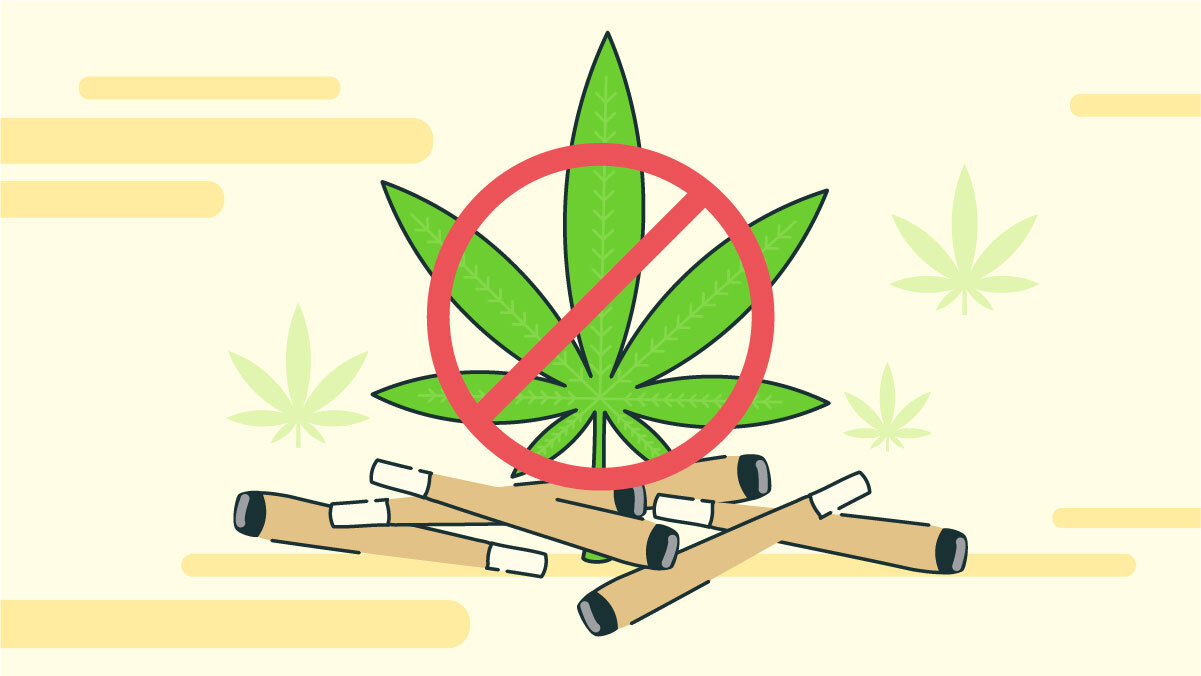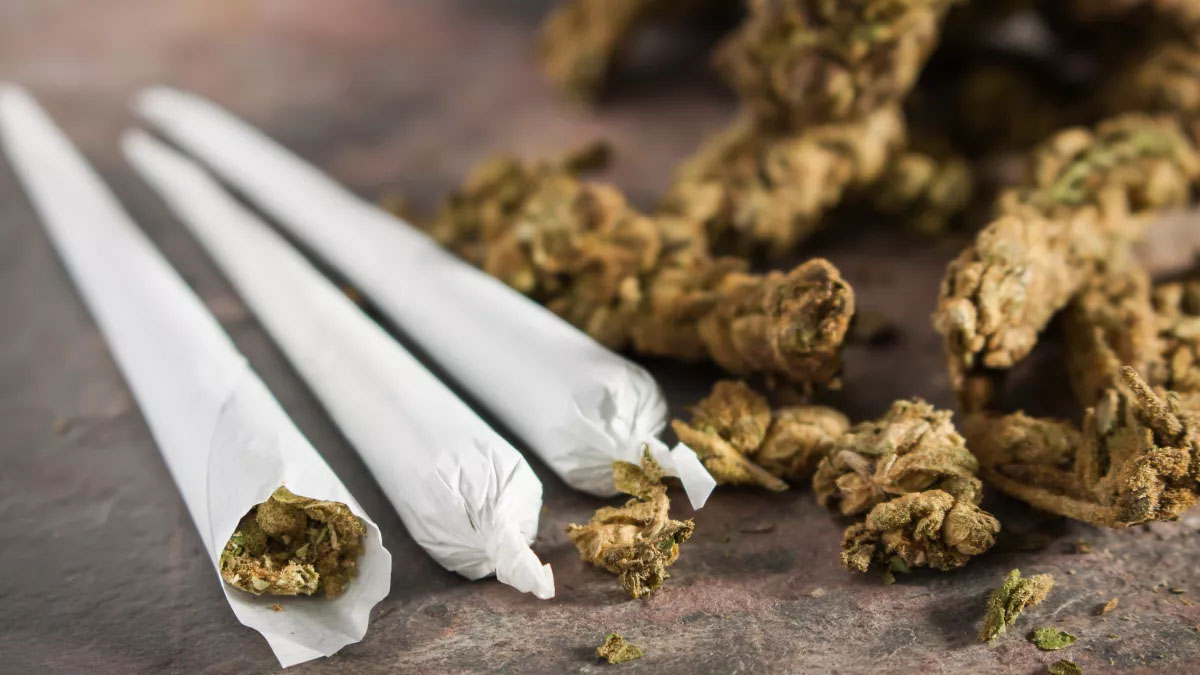What Happens When You Stop Smoking Weed?

Everyone knows what happens when a cigarette smoker decides to quit, or a drinker goes on the wagon. The physical effects they usually suffer can range between difficult and downright agonizing. And that’s not even mentioning the very real psychological effects of withdrawal.
When a habitual, long-time weed smoker decides to put down the bowl for good – whether it’s a personal decision or one forced on them by drug testing – the ramifications can be just as hard to deal with.
That might seem surprising. In fact, the annual “Global Drug Survey” asked 55,000 cannabis users around the world if they thought that marijuana is addictive – and more than a third said “no.”
Some medical experts call a dependence on weed addiction. Others describe it as a “marijuana use disorder.” But whatever term you use, it means that most regular users can’t quit using a pot without suffering problems that we’d all recognize as withdrawal symptoms.
Needless to say, those symptoms can be particularly bad for stoners.
Let’s look a little deeper.
Is Weed Really Addictive?
Not for everyone. Just as social cigarette smokers and drinkers can go weeks, months, or years without even thinking about taking a few puffs or having a cocktail, plenty of occasional weed smokers are able to quit without missing a beat.
However, experts say the possibility of addiction always exists. The National Institute on Drug Abuse (NIDA) estimates that around 10% of cannabis users are at risk of becoming addicted, with the risk much higher for frequent smokers. And the NIDA claims that three out of every ten weed users suffer from “some degree of ‘marijuana use disorder.’”
You might not trust the government’s data on drug use and abuse. But marijuana use disorder is an accepted medical condition and is listed in the DSM-5, the “bible” of U.S. mental health professionals.
The definition is lengthy but essentially says that people who have trouble controlling their use, can’t stop using, or find that cannabis use affects other aspects of their life, are suffering from marijuana use disorder. Experts also believe that the potency of modern weed has led to an increase in the number of people diagnosed with the disorder.
There’s no definitive evidence that weed contains substances that would create physical addiction in the way that nicotine or opiates do. But scientists do believe that heavy cannabis use may cause addiction via a different method.
THC causes floods of brain neurotransmitters like dopamine and serotonin, which cause pleasurable sensations that many users want to experience over and over again. What’s just as important, though, is that those neurological activities caused by THC largely occur in the area of the brain that regulates habit formation.
In other words, weed can apparently cause the brain to be addicted to marijuana, particularly in those who smoke a lot – hello, stoners! – and those who started at an early age.
Breaking any addiction is difficult, and the symptoms of cannabis withdrawal are quite similar to those experienced by those trying to quit other addictive substances.
Withdrawal Symptoms When A Stoner Stops Smoking

Whether it’s due to addiction, marijuana use disorder, or simply the disruption of a long-standing habit, trying to give up pot can be an ordeal.
A recent study of smokers who’d tried to give up weed found that more than 95% experienced at least one symptom of withdrawal. Almost half of them reported suffering from two or more symptoms. The longer and more the people had smoked, the more symptoms they experienced.
Here are the most common ones.
Weed Cravings
Anyone who’s tried to quit any habit – even gambling – knows that they start to crave whatever they’ve given up, almost immediately. In some cases, cravings are caused when the body experiences deprivation. In others, it’s a behavioral response. Most often, it’s a combination of both. (Yes, gambling withdrawal can cause physical symptoms, because the brain is deprived of the endorphins triggered by excitement and risk.)
Studies have shown that the vast majority of smokers trying to give up weed will experience strong cravings for at least a week after they’ve last toked up.
Mood Shifts, Anxiety, and Depression
The mental health effects of quitting weed are usually most severe in those with pre-existing conditions. Anxiety and depression often become more acute in people already dealing with those issues. But even “quitters” who don’t normally suffer from mood disorders can find their emotions swinging regularly, as they adjust to the loss of their long-time mood adjuster. Irritability and anger are also experienced often during cannabis withdrawal.
As with cravings, these feelings normally ease within a week or two. If they don’t, experts suggest consulting a mental health professional.
Insomnia, Bad Dreams, and Night Sweating
Sleep disruption affects nearly 50% of weed users who quit, at least for a few weeks. Difficulty falling asleep, or difficulty getting a full night’s sleep, are the most common problems and can persist for several weeks. Many who quit also find that they have vivid dreams about smoking (or other types of marijuana use) for weeks or months. Heavy smokers may experience night sweats during the early days of their withdrawal as well.
Other Possible Symptoms
Other physical reactions to weed withdrawal are less common than cravings, mood, and sleep disorders, but have been reported fairly regularly. They include:
- Headaches
- Loss of appetite, or weight loss (or gain)
- Stomach pain
- Fever, chills, or other flu-like symptoms
- Difficulty with concentration or focus
These symptoms should all ease or disappear within a week or ten days. If they last longer, medical advice should be sought.
Preparing To Quit Weed
There’s no physical risk to quitting cold turkey. “Tapering down” may seem like a smart approach, but quite honestly, it usually doesn’t work. Those who try gradually giving up weed usually find that they’re more likely to resume their normal consumption than they are to stop entirely.
The first few days of abstinence will be the worst, so it makes sense to be prepared for possible withdrawal symptoms ahead of time.
- Let family and/or friends know what’s happening. A caring support system will help you get through difficult periods.
- Have plenty of water and healthy food on hand. It’s important to stay hydrated, and eating junk will make you feel worse, not better.
- Plan to get at least half an hour of exercise each day. It will improve your mood while letting you sweat out some of the toxins still in your body.
- Meditation or breathing exercises can help you relax and relieve irritability. If you’re not usually the type for self-care techniques, at least look into them before you put the pipe or joints down for good.
- Maintain a regular schedule, going to sleep and waking up at the same time each day.
- Avoid social settings that may make you more anxious (or needless to say, ones where you’d be tempted to spark up).
If your attempt to quit fails, don’t get discouraged. Withdrawal is difficult to handle. The majority of people who try giving up weed aren’t successful the first time or even the second. When you’re ready, give it another try.
You’ll get there.
What Happens When A Stoner Stops Smoking? FAQ
Q: If you only smoke once a week or so, will you still experience withdrawal symptoms?
A: It’s different for everyone, but even occasional smokers are quite likely to suffer at least some cravings and irritability.
Q: Why would those who start smoking weed at an early age be more at risk for serious withdrawal problems?
A: Scientists believe THC’s effect on the brain’s neural circuits is more dramatic when the brain and body haven’t completed their development. Length of cannabis use is a major factor as well, but withdrawal is even more troublesome for stoners who started in their early-to-mid teens.
Q: Is there an actual treatment for “marijuana use disorder?”
A: Not really. It’s generally treated with psychotherapy, sometimes combined with the off-label use of anti-anxiety or sleep medications – and of course, the discontinuation of weed use.